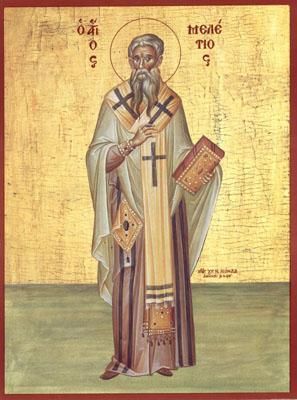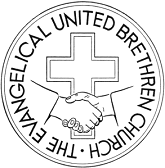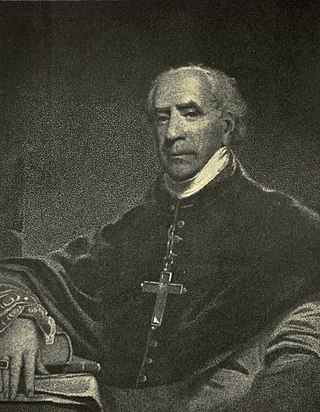Related Research Articles

The Council of Constance was an ecumenical council of the Catholic Church that was held from 1414 to 1418 in the Bishopric of Constance (Konstanz) in present-day Germany. The council ended the Western Schism by deposing or accepting the resignation of the remaining papal claimants and by electing Pope Martin V. It was the last papal election to take place outside of Italy.

Saint Meletius was a Christian bishop of Antioch from 360 until his death in 381. He was opposed by a rival bishop named Paulinus and his episcopate was dominated by the schism, usually called the Meletian schism. As a result, he was exiled from Antioch in 361–362, 365–366 and 371–378. One of his last acts was to preside over the First Council of Constantinople in 381.
The Evangelical Lutheran Church in America (ELCA) is a mainline Protestant Lutheran church headquartered in Chicago, Illinois. The ELCA was officially formed on January 1, 1988, by the merging of three Lutheran church bodies. As of 2021, it has approximately 3.04 million baptized members in 8,724 congregations.

The Methodist Episcopal Church (MEC) was the oldest and largest Methodist denomination in the United States from its founding in 1784 until 1939. It was also the first religious denomination in the US to organize itself on a national basis. In 1939, the MEC reunited with two breakaway Methodist denominations to form the Methodist Church. In 1968, the Methodist Church merged with the Evangelical United Brethren Church to form the United Methodist Church.
The Patriarch of Antioch is a traditional title held by the bishop of Antioch. As the traditional "overseer" of the first gentile Christian community, the position has been of prime importance in Pauline Christianity from its earliest period. This diocese is one of the few for which the names of its bishops from the apostolic beginnings have been preserved. Today five churches use the title of patriarch of Antioch: one Oriental Orthodox ; three Eastern Catholic ; and one Eastern Orthodox.

The Evangelical United Brethren Church (EUB) was a North American Protestant denomination from 1946 to 1968 with Arminian theology, roots in the Mennonite and German Reformed, and communities, and close ties to Methodism. It was formed by the merger of the Evangelical Church and the Church of the United Brethren in Christ. The United Brethren and the Evangelical Association had considered merging off and on since the early 19th century because of their common emphasis on holiness and evangelism and their common German heritage. In 1968, the United States section of the EUB merged with the Methodist Church to form the United Methodist Church, while the Canadian section joined the United Church of Canada.
The Church of the United Brethren in Christ is an evangelical Christian denomination with churches in 17 countries. It is Protestant, with an episcopal structure and Arminian theology, with roots in the Mennonite and German Reformed communities of 18th-century Pennsylvania, as well as close ties to Methodism. It was organized in 1800 by Martin Boehm and Philip William Otterbein and is the first American denomination that was not transplanted from Europe. It emerged from United Brethren churches that were at first unorganized, and not all of which joined this church when it was formally organized in 1800, following a 1789 conference at the Otterbein Church.
Quartodecimanism is the name given to the practice of celebrating the death of Christ on the day of Passover on the 14th of Nisan according to the biblical dating, being on whatever day of the week. The Quartodeciman controversy in the Church was over the question of celebrating Easter on the first day of the week, Sunday, or at the same time as the sacrifice of the Passover lamb.
Lyman Eugene Johnson was an early leader in the Latter Day Saint movement and an original member of the Quorum of the Twelve Apostles. He broke with Joseph Smith and Sidney Rigdon during the 1837–38 period when schism divided the early church. Johnson later became a successful pioneer lawyer in Iowa and was one of the town fathers of Keokuk, Iowa.
The Evangelical Church or Evangelical Association, also known in the early 1800s as the Albright Brethren, was a "body of American Christians chiefly of German descent". it was Arminian in doctrine and theology, and Methodist Episcopal in its form of church government,
The United Evangelical Church is a splinter group from the Evangelical Association

The Episcopal Church in North Texas was a diocese of the Episcopal Church from 1982 to its merger with the Diocese of Texas in 2022. The diocese included a geographic area of 24 counties in the north central part of Texas. As of 2021, it includes 13 churches, including a number of other congregations in the process of reorganization. The jurisdiction was the site of a major schism in 2008. This schism was the result of the diocese's bishop, Jack Iker, leading the majority of clergy and parishes to join the Anglican Church of North America as the Episcopal Diocese of Fort Worth. The Episcopal Church diocese is headquartered in Fort Worth, Texas. It announced on April 22, 2022 that it would seek reunion with the Episcopal Diocese of Texas. The merger was finalized by the 80th General Convention of the Episcopal Church in the United States of America on July 11, 2022.

The Reformed Episcopal Church (REC) is an Anglican church of evangelical Episcopalian heritage. It was founded in 1873 in New York City by George David Cummins, a former bishop of the Protestant Episcopal Church.

Henry Conwell was an Irish-born Catholic bishop in the United States. He became a priest in 1776 and served in that capacity in Ireland for more than four decades. After the Pope declined to appoint him Archbishop of Armagh, the diocese in which he served as Vicar General, he was instead installed as the second Bishop of Philadelphia in 1819.
Wesley Matthias Stanford was an American bishop of the United Evangelical Church, elected in 1891.

Friedrich Karl Otto Dibelius was a German bishop of the Evangelical Church in Berlin-Brandenburg, a self-described anti-Semite who up to 1934 a conservative who became a staunch opponent of Nazism and communism.

The Evangelical-Lutheran Church in Württemberg is a Lutheran member church of the Evangelical Church in Germany in the German former state of Württemberg, now part of the state of Baden-Württemberg.

Scottish religion in the nineteenth century includes all forms of religious organisation and belief in Scotland in the 19th century. This period saw a reaction to the population growth and urbanisation of the Industrial Revolution that had undermined traditional parochial structures and religious loyalties. The established Church of Scotland reacted with a programme of church building from the 1820s. Beginning in 1834 the "Ten Years' Conflict" ended in a schism from the established Church of Scotland led by Dr Thomas Chalmers known as the Great Disruption of 1843. Roughly a third of the clergy, mainly from the North and Highlands, formed the separate Free Church of Scotland. The evangelical Free Church and other secessionist churches grew rapidly in the Highlands and Islands and urban centres. There were further schisms and divisions, particularly between those who attempted to maintain the principles of Calvinism and those that took a more personal and flexible view of salvation. However, there were also mergers that cumulated in the creation of a United Free Church in 1900 that incorporated most of the secessionist churches.
Bishop John Jacob Esher was bishop of the Evangelical Association in Chicago, Illinois. In 1890-1891 he presided over a schism in the Evangelical Church and his followers were dubbed Esherites and they opposed the breakaway Dubsites. This led to the formation of the United Evangelical Church by the Dubsites.

The Evangelical Methodist Church of America Christian denomination based in the United States. Ardently Fundamental, the denomination has its roots in a movement of churches that broke away from Mainline Methodism in the 1940s and 50s.
References
- 1 2 "Evangelical Congregational Church history" . Retrieved 2014-07-19.
- ↑ "Bishop Rudolph Dubs is Seriously Ill". Reading Eagle . January 31, 1915. Retrieved 2013-12-23.